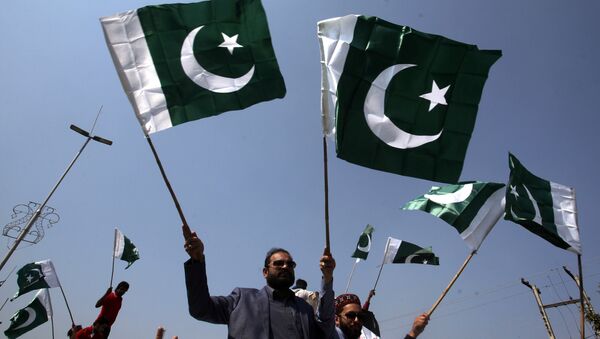Earlier in the day, the Indian Foreign Ministry said a Pakistani jet had been shot down in the aerial incident over the disputed Kashmir region, adding that India had also lost one Mig-21 aircraft. In turn, the Pakistani army said it had downed two Indian jets that crossed the so-called Line of Control (LoC) separating the Indian- and Pakistani-controlled parts of the Kashmir region.
The day before, the Indian Air Force carried out an airstrike against a camp of the Jaish-e-Mohammad terrorist group, which had claimed responsibility for the deadly terrorist attack against an Indian security convoy on February 14. The camp was situated in the Pakistani-controlled part of the Kashmir region. The Indian Foreign Ministry said that the attack was necessary. However, the Pakistani National Security Council reportedly rejected the claims that the airstrike targeted terrorists.
READ MORE: India Urges Pakistan to Immediately Release Pilot Arrested Over Kashmir Incident
World's Leaders to Step in
The majority of experts interviewed by Sputnik doubted that the current aggravation on the Pakistani-Indian border would escalate into outright military conflict, while those who did not rule out such a possibility mentioned a number of factors that were capable of preventing such a scenario.
Zahid Shahab Ahmed, a research fellow at Australia's Alfred Deakin Institute for Citizenship and Globalization, said that India's and Pakistan's current state of heightened conflict might further aggravate the situation.
"It is very likely that this escalation may evolve into a full-scale war, but I do know many factors that will stop that from happening… The international community, which appears to be sleeping, for the time being, may wake up and engage in back-channel diplomacy to convince India and Pakistan to stop this escalation from moving in the direction of a full-scale war. In this regard, the role of Russia, the United States, China and the United Nation is very important," Ahmed said.
Yaqoob Khan Bangash, an assistant professor at the Information Technology University in Pakistan's Lahore, for his part, mentioned the possible intervention of foreign states in the conflict as a factor that would bring the chances of a military option in the region to zero.
"It is unlikely that this will evolve into a full-scale war… Before the tensions lead to a full war the international community will step in and lead a cooling of tensions. The United States under [President Donald] Trump might not want to ideally do it, but it will be pushed to take action, if there is a real chance of a full war," Bangash argued.
READ MORE: #SayNoToWar Trending on Twitter in India and Pakistan
Limited Escalation
Shaun Gregory, a professor of international security and director of the Pakistan Security Research Unit (PSRU) at Durham Global Security Institute, said that earlier escalations of conflict between the two countries suggested that the current situation was likely to confine itself to a limited escalation.
"If the past is a guide, there will be a limited escalation along the LoC with lots of fiery rhetoric as [Indian Prime Minister Narendra] Modi seeks to exploit the situation for the Indian election and Pakistan seeks to counter. The escalation to cross-border strikes and dog-fights in the air is unusual but not unprecedented. I doubt this will escalate into a full-scale conflict," Gregory stated.
Bangash disagreed with Gregory on his point that the upcoming general election in India created a deterrent, arguing that the Indian prime minister would not be able to leave Pakistan's actions without response.
"With a general election just months away, Modi cannot be seen as 'easy' on Pakistan and will be under intense pressure to respond, this time clearly and verifiably. This means that there might be an escalation," Bangash said.
He, at the same time, suggested that both India and Pakistan knew the possible consequences of muscle-flexing.
"Therefore, as an interim measure India might just increase tensions on the LOC and the border and claim further attacks on militant groups inside Pakistan-administered Kashmir or Pakistan proper," Bangash pointed out.
Gregory, for his part, shared Bangash's belief that the conflict's area will be limited to the LoC, which might see some artillery exchanges.
"Past precedents suggest some force mobilization and alert status increases along the border, which may or may not go beyond the LoC to the rest of the Pakistan-India border, and, perhaps, minor exchanges of artillery, small-scale force incursions, or 'surgical' airstrikes, though, it is difficult to see what Pakistan could hit on the Indian side without attacking its military directly," Bangash stressed.
READ MORE: 'Trigger-Happy' Elements in India & Pakistan May Ratchet Conflict Up — Activist
Nuclear Deterrence
The three experts agreed that the factor of nuclear deterrence was valid in regard to any confrontation between the two countries, which both possess nuclear weapons.
"Both India and Pakistan do not want to risk a nuclear conflict. They have already had a limited war in 1999 after going nuclear and therefore they could do a replay of the same strategy. A replay of Kargil [War between India and Pakistan in 1999] will allow both countries to vent, claim victory, and then open up dialogue after a limited war has been given a chance," Bangash stated.
Gregory belaboured this point, saying that the current crisis as a whole was about the Indian-Pakistani nuclear rivalry.
"Pakistan is worried about India's new submarine-based nuclear weapons… as a new destabilizing threat to Pakistan… India makes the same claims about Pakistan's short-range Nasr missiles which it sees as destabilizing," Gregory indicated.
He added that the two countries not only had to end the escalation, but also take meaningful steps to initiate a dialogue that would lead to sustainable peace.
READ MORE: Bad Karma: Global Markets Struck by Spike in India-Pakistan Tensions
The views and opinions expressed by in this article are those of the experts and do not necessarily reflect those of Sputnik.



